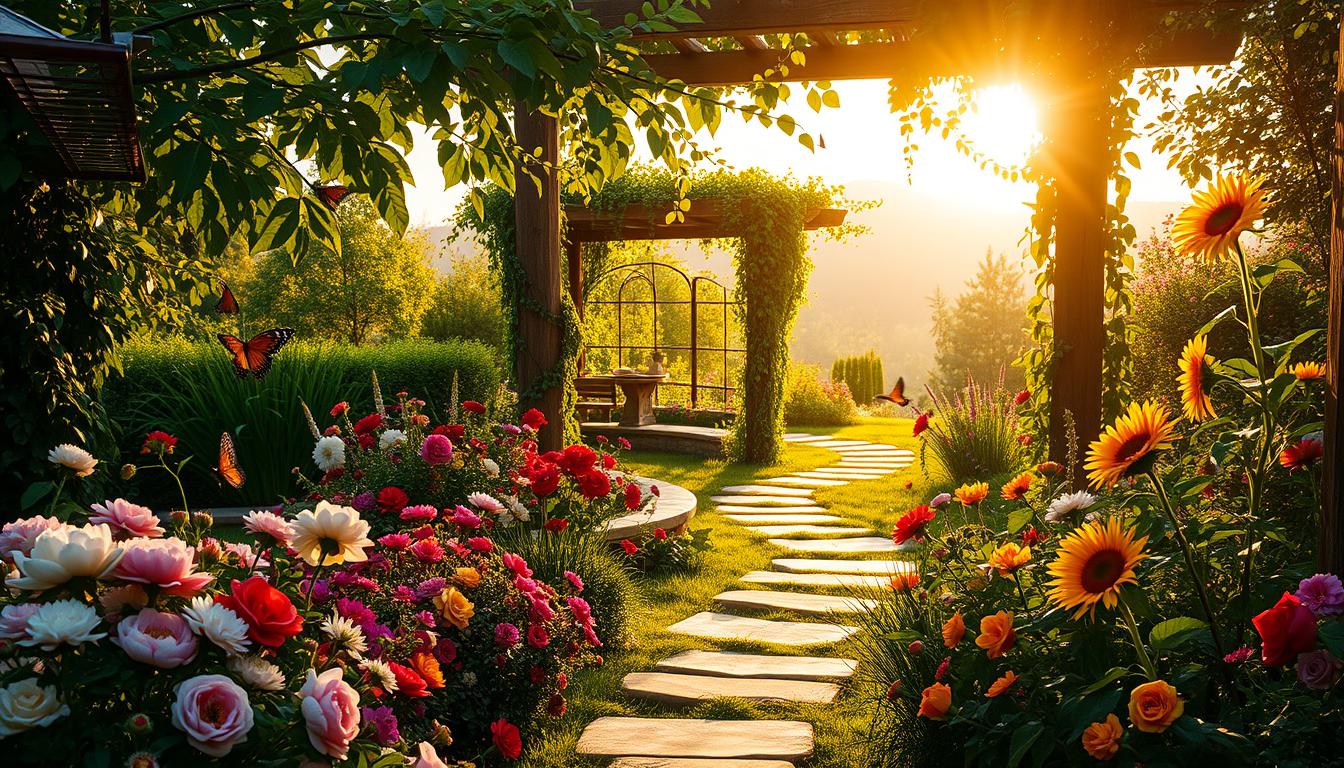
Garden Aesthetic
Ever stepped into your backyard and felt a bit let down? Many homeowners struggle to make their garden look like they dreamed. But what if making your outdoor space a dream garden was simpler than you thought?
Garden aesthetics are key to creating an outdoor paradise that shows off your style. The right design can make a plain yard into a beautiful retreat. Let’s see how you can make your garden come alive and make it your own.
Whether you love wild cottage gardens or sleek modern designs, your dream garden is possible. By learning about garden aesthetics, you’ll be on your way to creating a beautiful outdoor space. Ready to discover the secrets of a captivating garden? Let’s start!
Understanding Garden Aesthetic and Its Modern Appeal
Garden aesthetics have changed, blending modern trends with the charm of a pretty garden. Today, garden designs are both stylish and practical. They offer beauty and function in one.
Defining Contemporary Garden Style
Contemporary garden style is all about clean lines, bold shapes, and varied materials. It often features:
- Geometric patterns
- Minimalist plant selections
- Innovative use of space
- Sustainable elements
These elements make gardens sleek and welcoming.
Cultural Influences on Garden Design
Gardens show off different cultures, creating unique looks around the world. Japanese Zen gardens offer calm, while Mediterranean designs add warmth and color. These global touches make gardens tell stories and stir feelings.
The Psychology of Garden Spaces
Good garden design boosts our well-being. The right colors, textures, and layouts can:
- Reduce stress
- Improve mood
- Boost creativity
- Promote relaxation
A well-planned garden is a haven for our minds and souls.
| Garden Style | Key Features | Psychological Benefits |
|---|---|---|
| Contemporary | Clean lines, bold shapes | Clarity, focus |
| Cottage | Lush, informal plantings | Comfort, nostalgia |
| Zen | Minimalist, natural elements | Tranquility, mindfulness |
Elements of Cottagecore Garden Design
The cottagecore garden trend has taken root, bringing a touch of rustic charm to outdoor spaces. This design style captures the essence of a quaint cottage garden. It blends natural beauty with vintage appeal. Let’s explore the key elements that make up this enchanting garden aesthetic.
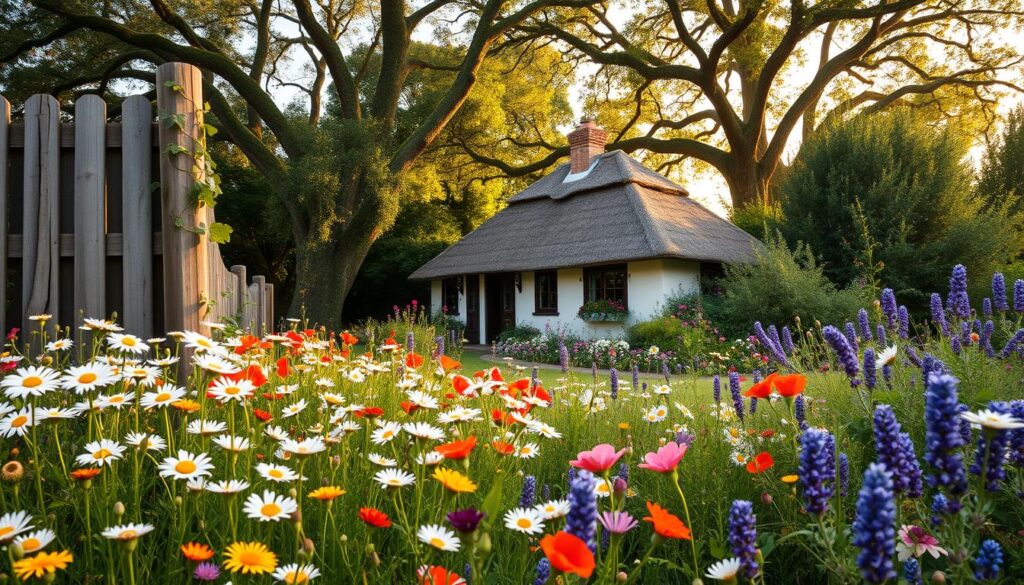
Wildflower Integration
Wildflowers are the heart of a cottagecore garden. Scatter seeds of native blooms like daisies, cornflowers, and poppies throughout your space. These colorful flowers create a whimsical, meadow-like atmosphere that’s both beautiful and low-maintenance.
Plant them in clusters for a natural, unstructured look. This look embodies the carefree spirit of cottage gardens.
Vintage Garden Accessories
Incorporate antique or vintage-inspired items to add character to your cottagecore garden. Old watering cans, weathered wooden crates, and wrought iron benches can serve as charming focal points. Repurpose items like tin buckets as planters or hang vintage bird cages filled with trailing vines.
These unique touches bring personality and nostalgia to your outdoor space.
Rustic Pathways and Borders
Create winding paths using natural materials like gravel, stepping stones, or reclaimed bricks. Edge your garden beds with salvaged wood or woven willow fencing for a rustic look. These elements add structure to your cottage garden while maintaining its informal charm.
Use climbing roses or arches covered in clematis to frame pathways. This invites visitors to explore your enchanting garden retreat.
Creating Your Secret Garden Sanctuary
Ever dreamed of a hidden oasis? Make your secret garden a reality with these magical ideas. Turn a corner of your yard into a private spot where you can hide from the world and connect with nature.
First, pick a quiet spot. Use tall shrubs or a trellis with vines to make walls. These will keep your sanctuary hidden and quiet.
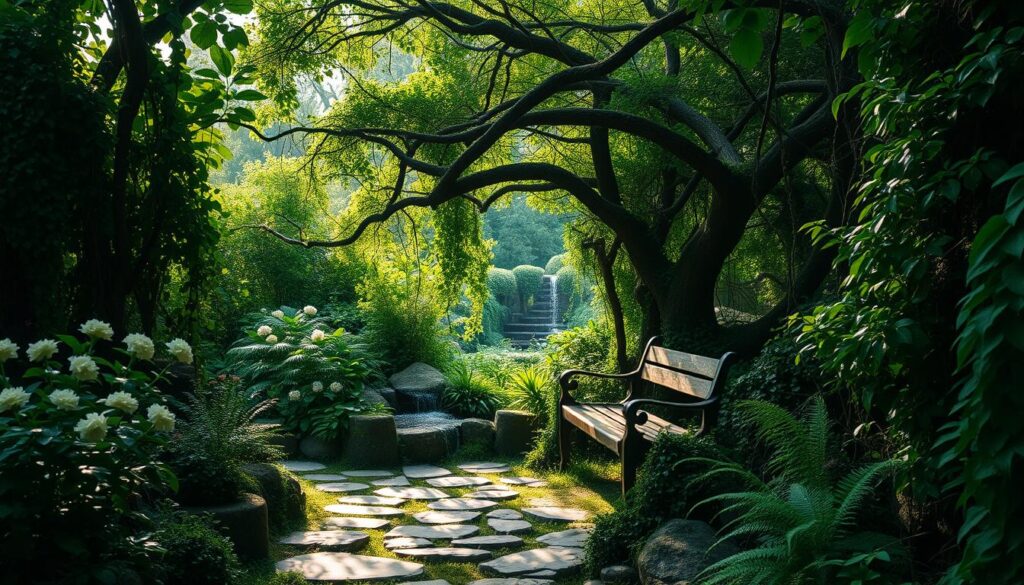
Next, add a winding path of stones or bricks. This path will guide visitors into your secret world. Plant ferns, flowers, and herbs along the way for a sensory treat.
Make a cozy spot at the garden’s heart. Use a vintage bench, iron chairs, or a hammock as your retreat. Surround it with plants and hanging baskets full of colors.
To make it even more magical, consider:
- A bubbling fountain or small pond
- Whimsical ornaments like gazing balls or fairy houses
- Soft lights from lanterns or string lights
- A hidden book nook for quiet reading
Your secret garden should show who you are. Add things that make you happy and peaceful. With some planning and creativity, you’ll create a personal paradise that invites you to relax and dream.
Natural Garden Elements for Sustainable Beauty
Creating a natural garden that follows farm life principles can turn your outdoor space into a green haven. By adding eco-friendly elements, you’ll make your garden more beautiful. You’ll also help local wildlife and cut down on upkeep.
Native Plant Selection
Choosing native plants is essential for a thriving garden. These plants need less water and care because they’re made for your area. They also feed and shelter local wildlife, making your backyard a mini-ecosystem.
Think about planting wildflowers, native grasses, and indigenous shrubs. They bring the spirit of farm life into your garden.
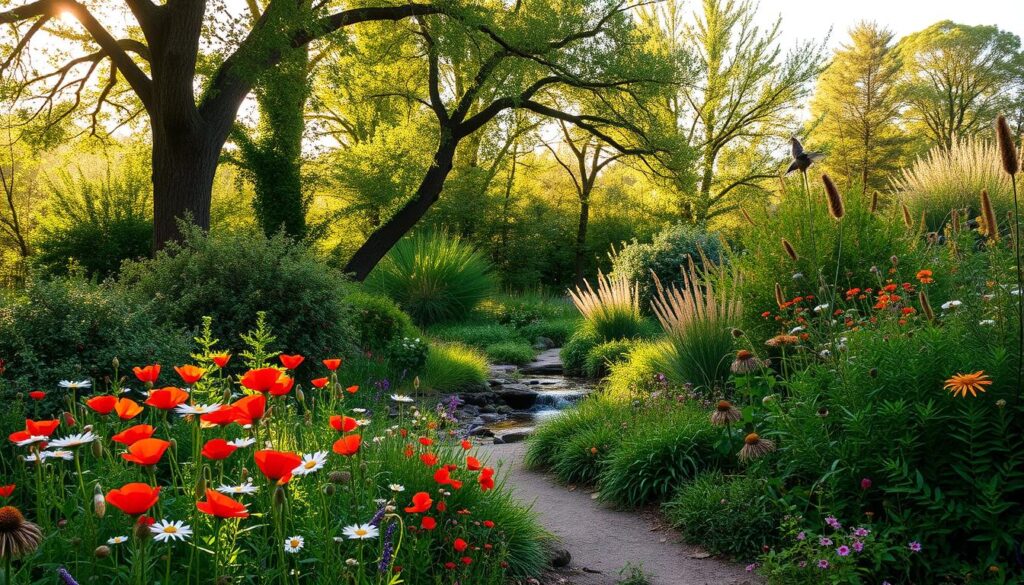
Eco-friendly Water Features
Water features bring peace to your garden and help biodiversity. A small pond or rain garden can draw in helpful insects and amphibians. For something easy to care for, try a solar-powered fountain. It recirculates water and sounds like a brook.
Wildlife-friendly Spaces
Make your garden a welcoming place for wildlife. Set up bird feeders and baths, plant flowers that attract butterflies, and leave some areas wild. These features add to your garden’s natural beauty and help create a balanced ecosystem, just like traditional farm life.
With these sustainable elements, your garden will become a lively, easy-to-care-for space. It will celebrate nature’s beauty and the simplicity of farm life.
Minimalist Garden Design Principles
Minimalist garden design is all about simplicity and clean looks. It makes outdoor spaces calm and visually appealing, yet easy to keep up. Let’s dive into the main ideas that make minimalist gardens special.
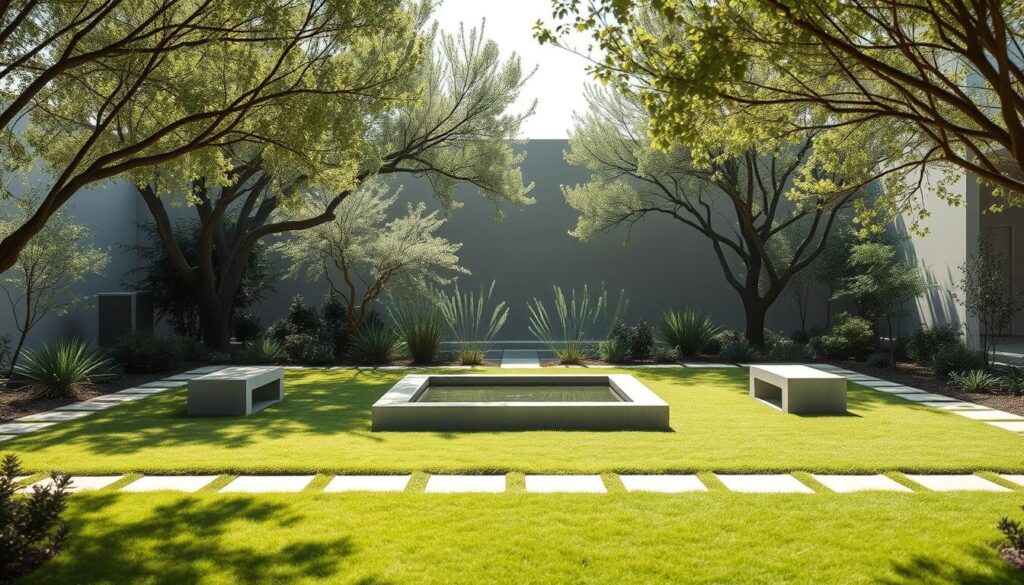
Clean Lines and Simple Layouts
A minimalist garden starts with clean lines and a simple layout. Straight paths, geometric shapes, and clear borders bring order. Use materials like concrete, stone, or gravel for sleek surfaces that match nature.
Strategic Plant Placement
In minimalist gardens, simplicity is key. Pick a few plants and place them thoughtfully. Group similar plants for impact and leave space between them. This makes each plant stand out in the garden.
Low-maintenance Features
Minimalist gardens focus on being easy to care for. Choose plants that don’t need much water or pruning. Add rock gardens or sculptures to cut down on upkeep. Automated watering systems make caring for your garden even easier.
| Feature | Benefit |
|---|---|
| Limited plant variety | Simplified care routines |
| Hardscaping elements | Reduced watering needs |
| Automated systems | Time-saving maintenance |
By following these minimalist garden design tips, you can create a stylish and easy-to-care-for outdoor space. It will be calm and sophisticated.
Incorporating Cozy Garden Retreats
Turn your outdoor area into a cozy garden paradise with these ideas. Create cozy spots that mix comfort with nature, great for relaxing or small gatherings.
Begin with comfy seating. Use plush cushions and soft throws on benches or chairs. An outdoor sofa or hammock is perfect for lazy days reading or napping outside.
Consider adding a fire pit or outdoor fireplace. The flickering flames add warmth and make your garden inviting at night. Place seating around it for a natural meeting place.
Set up a cozy dining area for outdoor meals. A small table with chairs among fragrant flowers is ideal for romantic dinners or brunches with friends.
| Element | Purpose | Garden Inspo |
|---|---|---|
| Soft Textiles | Comfort | Outdoor pillows, throws |
| Lighting | Ambiance | String lights, lanterns |
| Plants | Privacy | Climbing vines, tall grasses |
Use plants and structures to make your space feel enclosed. Trellises with vines, tall shrubs, or a pergola with fabric provide privacy and shape your cozy garden.
Add soft lighting for a magical feel at night. String lights, lanterns, or plant uplighting create a warm glow as the sun goes down, making your garden a special place.
Garden Aesthetic Lighting Solutions
Lighting is key to a pretty garden. The right lights can turn your outdoor area into a magical spot at night. Let’s look at some cool lighting ideas to make your garden more charming.
Solar-powered Options
Solar lights are good for the planet and save money. They soak up sunlight during the day and light up at night. Solar string lights, path markers, and spotlights can make your garden welcoming without raising your energy costs.
Ambient Evening Illumination
To make your garden cozy, mix different lights. Use soft lights on trees, gentle ones on paths, and warm lanterns. Fairy lights on pergolas or bushes add magic to your space.
Seasonal Lighting Strategies
Change your garden lights with the seasons to keep it looking great all year. In spring and summer, highlight flowers and greenery. Amber lights are good for fall to match the leaves. Winter needs creative lights to show off bare trees and evergreens.
| Season | Lighting Focus | Recommended Colors |
|---|---|---|
| Spring | New growth, early blooms | Soft white, pale yellow |
| Summer | Lush foliage, vibrant flowers | Bright white, cool blues |
| Fall | Changing leaves, harvest decor | Warm amber, orange tones |
| Winter | Evergreens, bare branches | Cool white, icy blue |
With these lighting tips, your garden will be beautiful at night all year. It will be a cozy spot for any season.
Blending Indoor and Outdoor Living Spaces
Creating a dream garden means blending your indoor and outdoor spaces. This way, you can make a garden that improves your daily life. Think of your patio or deck as part of your home, where comfort meets nature.
Choose furniture and decor that match both your home’s style and the outdoors. Cozy outdoor sofas, weather-resistant rugs, and plush cushions can make a patio inviting. Adding potted plants brings greenery closer to your home, making the transition smooth.
For the best garden look, consider big sliding glass doors or French doors. They let natural light in and offer great views of your garden. When open, they connect your indoor and outdoor spaces perfectly, great for parties or quiet mornings.
- Use similar color schemes inside and out
- Incorporate outdoor kitchen elements for al fresco dining
- Add a pergola or awning for shade and definition
- Install outdoor lighting to extend usability into the evening
The secret to a great indoor-outdoor blend is consistency. By using your interior design in your garden, you’ll have a look that’s truly yours. With careful planning, your outdoor area can be a peaceful escape right next to your living room.
Seasonal Changes in Garden Design
A natural garden changes with the seasons, bringing new joys all year. By adjusting your garden to each season, you create a lively outdoor space. It stays interesting from spring to winter.
Spring Planning and Planting
As winter ends, get your garden ready for growth. Start seeds indoors and plan your garden’s layout. Add compost to the soil. Pick early-blooming bulbs and perennials to start your spring garden.
Summer Maintenance Tips
In the hot months, keep your garden healthy. Water regularly, mulch, and prune. Remove spent flowers to keep plants blooming. Use drought-resistant plants to keep your garden green with less water.
Fall and Winter Garden Beauty
Enjoy autumn’s colors by adding plants with vibrant leaves. Plant bulbs and late-blooming perennials. For winter, use evergreens, ornamental grasses, and plants with interesting bark or berries.
| Season | Key Garden Tasks | Plant Focus |
|---|---|---|
| Spring | Soil preparation, seed starting | Bulbs, early perennials |
| Summer | Watering, pruning, pest control | Annuals, vegetables, drought-resistant plants |
| Fall | Planting bulbs, cleanup | Late-blooming perennials, trees for fall color |
| Winter | Protection, planning | Evergreens, plants with winter interest |
Small Space Garden Transformation Ideas
Got a tiny outdoor area? Don’t let size stop you from creating your dream garden! Vertical gardening is a game-changer for small spaces. Try hanging planters or wall-mounted herb gardens to maximize your greenery without taking up floor space. These clever solutions offer instant garden inspo and make the most of every inch.
Container plantings are another fantastic way to bring life to compact areas. Mix and match pots of different sizes and colors to add visual interest. Fill them with a variety of plants, from cheerful flowers to tasty vegetables. This approach lets you easily change your garden’s look with the seasons, keeping your outdoor space fresh and exciting.
Multi-functional design elements are key in small gardens. Look for benches with built-in storage or foldable furniture that can be tucked away when not in use. These smart choices help create a versatile outdoor living area that adapts to your needs. With a bit of creativity, even the tiniest balcony or patio can become a lush, inviting oasis – your very own pocket-sized dream garden!
Leave a Reply